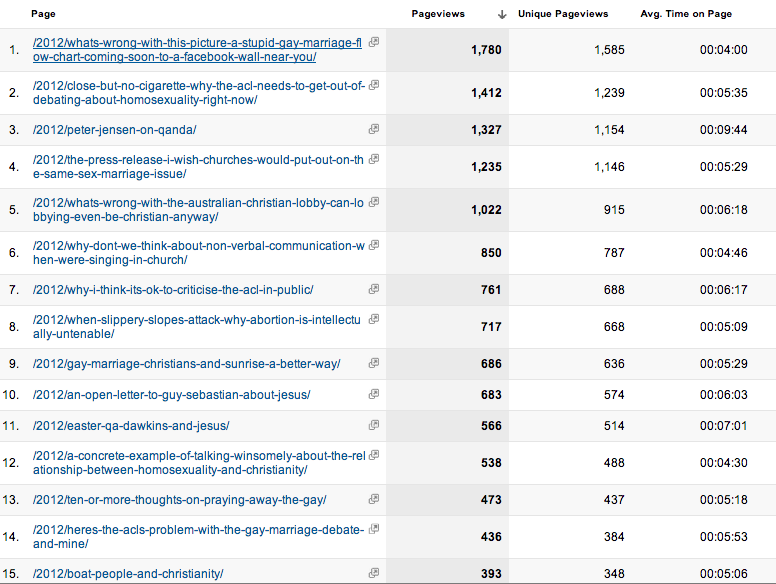Continuing this little series on building a new church website I thought I’d go through a little bit of how to fill your outsider focused site, designed with the modern web consumer in mind, once you’ve found, or defined, your voice.
This takes two separate but related bits of thinking: A content strategy and a content schedule. It’s quite possible that the thinking you put into your web based content strategy and content schedule will actually double as your communication strategy and your communication plan which will cover how you communicate offline as well. This is a good, and mostly necessary, step. But I’m jumping right into the latter, because that’s what I’m working on right now, and knowing that in our case, the teaching plan for the year at church is well and truly bedded down. If you’re just starting with a web content strategy, that’s fine, but it might feel like cart before horse stuff.
The step after this, which depends on having content is your distribution strategy, and somewhat relatedly, what to do with comments and discussion about your content. That can get its own, subsequent, post, but you should read this study about the impact of comments on the web in the meantime.
Your content strategy (and a bit about information architecture)
There are a few ways to approach the question of what content you’re going to put on your site, and a few style type decisions you’re going to have to make in the process. The first is choosing whether you’re building a static site (where the content is fixed, and a schedule might involve a periodic update – this is the easiest option), a dynamic site (a site where new content is generated in a steady stream, where a schedule is really important, or the stream will stagnate – this option is the most work), or a site with a mix of static and dynamic elements.
You could, I reckon, mount an argument by analogy from the nature of God’s interactions with creation that the last is the best. If you’re familiar with deism – the idea that God set up the world and then walked away – the static site is the deistic option. Set it up. Forget it. It’ll point to the existence of your church, but won’t really help people know it beyond whatever content they can observe from a very small amount of evidence. The purely dynamic site is more like open theism – this is a simplification of open theism – but there’s nothing concrete. Everything changes. According to the whims of the webmaster. There’s not really much consistency and nobody really knows what to expect. The mixed site – which I like the best – involves a well thought out creation, that is good and purposeful, with fixed rules and structures, but a long term commitment to engaging with the world. The analogy breaks down in all sorts of ways, and isn’t really that useful… except that static sites aren’t all that great, and purely dynamic sites are dangerous).
While I’m a big fan of the static/dynamic mix – there are actually good reasons to choose a static site, if your resources are limited. If this is the case, don’t start a blog on your website and leave it with the “hello world” post that WordPress gives you as a default… That undermines the credibility your website is attempting to give your church as it proclaims an important message. It says “I’m lazy” or worse “I’m uninspired”… A static site, at the very least, should give a visitor an idea of what your church is on about, where it is, and how to contact you.
The voice you’ve developed comes into play when you’re writing the static part of your site – but so to does the content strategy. Are you going to be take a minimal approach to content, or try to give as much information as possible. Is your information architecture going to be simple – with as few pages and clicks as possible, or complex with complicated menus and trees and a huge dependance on your site’s search capabilities?
So we’re going with a mix of static pages that tell our visitors who we are and what we’re on about as a church (the gospel of Jesus), that use a mix of multimedia and carefully structured text, erring on the side of saying too much rather than not enough, and a blog where we demonstrate who we are and try to provide valuable content for visitors to our site that serves our mission as a church.
A content strategy for static pages
It’s counter-intuitive – but I think with some careful writing and layout you’re actually better off doing a relatively flat, minimal click, site structure, with a fair bit of content per page.
There are good search engine optimisation reasons for writing pages that use lots of relevant keywords together, and I think there’s huge value in producing a site that actually answers the questions people might be bringing to a search for a church in a transparent and open way. I’m also pretty convinced that long valuable content is a better long term strategy than minimal content – though it is really important to be aware that not everybody reads the web in the same way.
This means each page should have a nice clear lead paragraph that explains what you’re on about in the rest of the page – recognising that a fair percentage of your audience will stop reading and click away there – and making the opening paragraph link heavy, so you can control where people are clicking to next, I’m a big fan of anchor links that take people to specific sections of the same page too, they can be a really useful heuristic tool.
Basically my approach to content writing is based on the good old inverted pyramid that journalists use.

Image Source: Wikipedia: Inverted Pyramid
The inverted pyramid is useful for a couple of reasons – it recognises that some people want all the background stuff, but others only want the news at a glance, and it means if you’ve got limited space people don’t lose out on the real substance of what you want to communicate if they ignore the bottom two thirds.
You are more than a headline. Your website, hopefully, is occupying something more significant than the role a headline plays in a news story. There are good reasons for an exceptionally minimal approach to marketing a product – especially if the product is well known, or if you want to create some sort of buzz, or vibe. But if you’re after a user-friendly website, that will make an interaction with your church in the real world less painful for somebody who is not familiar with who you are, because they’re more informed, then just having your particular buzzword like “PRUNE” in really big text isn’t actually telling anybody about who you are or what they can expect.
And you also can’t rely on videos and multimedia to carry the can (and they certainly won’t help with how you come up on a search engine). While videos won’t play nice with search engines, the use of testimonials from real people is, I think, a really nice way to not be blowing your own trumpet, and to be authentic. That’s why people use written testimonials, but videos help carry a bit of pathos and ethos along with the written world. They’re moments of oratory captured for ongoing use.
Which means you need text. And I think more is more. Or rather, enough is enough. But you need to structure it with a mind to how people read websites – they scan, they look for links, they click away, and structure your content accordingly. So that a visitor to your site can both find what they’re looking for, and get a sense of what you’re trying to tell them about, with minimal fuss.
A content strategy for a church blog
So once you decide you want a dynamic aspect to your site, and you’ve allocated resources to the site for a certain amount of time (you can always reassess and downgrade to a static site if you can’t maintain a schedule), you need to decide what sort of stuff you’re going to post, and there’s a few factors to weigh up when you’re answering this question.
- Who are you? Part of this is knowing what your voice will be, but a bigger deal is figuring out if you’re existing online as a particular individual within your church (the minister), as the church speaking corporately, or as individuals from your but before that you need to figure out what your “brand” is – what is your ethos that you want driving your communication? How do you want to present yourself to outsiders so that they get a feel for who you are.
- Who is your audience? How wide are you casting your net? If your site is for newcomers are you just blogging for non-Christians? Do you also want to be providing resources for other Christians?
- Why are you posting? What’s the purpose of having a dynamic page – just for google links, to provide resources, etc?
- How does your blog content relate to the real world that people will experience when they visit your church? How does it match up to your philosophy of ministry?
- Who will write your content? Will it be a team of individuals as individuals, or a corporate mothership with multiple contributors adhering to the same style guide?
- What are you going to write about? Are you going to generate content? Are you going to link to other resources?
- How often will you post, and how substantial will your posts be?
Here’s a case study for how we’re thinking about our blog at church, which will then inform the schedule/plan we put together for our blog.
I’m thinking that it’s not too weird to have our static pages (to use a nice WordPress distinction) speaking in a “corporate voice” – so using a royal “we” and hopefully saying things that every member of our church family would be happy to have said on their behalf, with a personality that’s a bit representative of how we do things on a Sunday, and think about ourselves, and then to have our posts, on our blog, using particular voices – from particular individuals within our church family. So there’ll be a little less consistency in style, but we’ll also be giving people a picture of who they might meet on a Sunday, and who in our team and congregation is interested in different areas.
We’re pretty keen for our website to primarily be about the newcomer – but we also want to give the newcomer an accurate picture of what we’re on about without them having to sign up to be part of The City, our online community – so we want to be providing content for people who are part of our church to share with their non-Christian friends, content that reflects on what it means to be a Christian, and we’re also committed to using our resources, as a bigger church, to serve other churches who are, like us, trying to reach people in our world with the gospel.
We’ve got a philosophy of ministry that is pretty helpful for shaping our editorial policy – how we decide what goes up, and what doesn’t. We use a pathway for how we think about how individuals move from being a visitor to a mature, servant hearted Christian – and we use the words: Connect, Grow, and Serve. These will become the categories that we use for our blog. We also teach through books and topics in groups of ten – in line with the school term, which gives us a nice period of time to produce material related to the big idea of a Sunday service.
Connect will feature bits and pieces that help newcomers connect with the gospel, resources for people thinking about Christianity and joining us to process whatever issues the current series is raising, links to the podcast, some bits and pieces about church life, and maybe some interactions with pop-culture and current events. Grow will feature book reviews, interesting and useful articles, resources for living as a Christian, some more in-depth reactive stuff when it comes to pop-culture and current events. Serve will feature resources that we’re producing for other people, outside of Creek Road, to use for ministry – kids church material, some articles from our staff on different aspects of what we’re doing as a church, etc – and both the Grow stuff and the Serve stuff will be produced mindful that it’s being published to an audience of everyone.
The content will be produced by a number of different contributors, centralised, checked for consistency and moderated and posted by one or two people. It’ll include a mix of videos, text, links, and pictures. And the content will either support or duplicate what is happening at Church on a Sunday, so that there’s consistency in our messaging across our different distribution platforms. This means a lot of our content is generated by what we’re already doing, but appropriated for the web, and some of it will be generated to support what we’re doing, and to articulate how we’re doing it, which is a pretty useful process and hopefully won’t bog our staff and content producers down.
Your Content Schedule
This is a pretty tricky area with millions of different opinions. Here are a couple of maxims I live by:
Blogging regularly is important for keeping on going.
A blog that isn’t updated regularly dies, and stinks up the place (where the place is your website).
The problem with these maxims is that it’s impossible to know what regularly is. 6 times a day is too regular, and you should probably see a doctor. Once a week is probably at the other extreme.
The most important thing here is to have a plan, and try to stick to a minimum. The thing I like about our content strategy is that there’s a mix of proactive stuff – where we’re running the agenda, and putting out material that supports our ongoing ministry, and reactive stuff, where we’re joining existing conversations that are happening in the public and using those conversations as opportunities to express our key message – the gospel. Having that freedom is really nice, it makes sure we’re not missing anything essential, but that we have the freedom to take opportunities as they arise, without being inconsistent or piecemeal in our online presentation.
My plan, partly design driven, is to be preparing posts in triplets – one for each category – and featuring them in dedicated boxes on our home page by relying on certain WordPress processes, rather than needing to do things manually. That means getting a pool of content generated for release ahead of time, and keeping ahead – it helps that we’re planning our sermon series a long time in advance, and having most of the content sorted months in advance too. The lead time in the teaching team’s thinking means there’s time to generate supporting content before the last minute.
This also means we need to plan a slot for reactive stuff. And planning to be reactive is hard, and counter-intuitive. But there are certain events we know are going to happen ahead of time (like a Federal election), and there are pop-culture type events like movie releases, or music releases, that other things might trump, and that aren’t as time critical. Plus, there’s always something to react to.
I’m wanting to sketch out a schedule in line with the teaching plan, and have a more concrete schedule for a term, with posts produced at that point (before the term, if possible), and then a slightly more flexible weekly or fortnightly schedule for some reactive things. Steve Fogg has this cool template for church communications planning that’s worth using at this point. I’ll be putting together something like this with three different columns dedicated to blog categories.








How I’m hoping to aid clarity in online discussion
Some of the responses to some of my recent posts have been interesting. There are now more people reading St. Eutychus that I don’t know than there are people who I do. People who haven’t been following along for the six years I’ve been posting on this blog. So I’ve done some housekeeping.
I’ve updated my about page to be something more substantial than a staccato list of definitive factoids about me.
I’ve created a comment policy.
And I’ve edited my disclaimer.
I’m going to expect that people who comment here have familiarised themselves with these before they attack me (not before they comment), so they’ll be useful to refer people to. But they also say something about why I blog, what I blog, how I see this blog, and how I see conversation on this blog. They provide the interpretive context for reading each of my posts.
I’d love your feedback on each, or all of these – especially if you think my expectations are ridiculous or I’m incredibly wrong about any of it.
While I was doing some housekeeping I moved the Facebook comment form off the home page and onto each individual post, where previously it was on both. It was slowing down the page too much and a little too cluttered. Clutter reduces clarity.
October 20, 2012